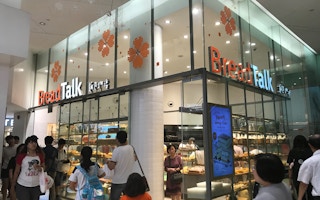Attempts by food and beverage retailers in Singapore to reduce the amount of single-use plastic they use are paltry, a recent audit conducted by local non-profit Zero Waste SG has revealed.
To continue reading, subscribe to Eco‑Business.
There's something for everyone. We offer a range of subscription plans.
- Access our stories and receive our Insights Weekly newsletter with the free EB Member plan.
- Unlock unlimited access to our content and archive with EB Circle.
- Publish your content with EB Premium.
Of the 100 retailers included in Zero Waste SG’s BYO Singapore Guide 2018 audit, only three retailers received the highest rating of three stars. Fourteen retailers received two stars, while 83 retailers received the lowest rating of one star.
To assess their efforts at reducing single-use plastics, a set of 12 yes/no audit questions were posed to retailers, with points awarded if the answer was ‘yes’. More points were awarded for initiatives that showed a greater commitment to reducing single-use plastics.
For example, if a retailer provided incentives such as cash discounts or reward points for customers who brought their own reusable bags or containers for takeaway, the retailer would be awarded three points. If cashiers simply ask customers whether they need a plastic bag, the retailer would only be awarded one point.
Retailers would receive one star for a total of 1–4 points accrued, two stars for 5–8 points, and three stars for 9–20 points.
“
Some of the retailers we’ve approached mentioned they are hesitant to do more [to reduce plastics usage] because they are wary of customers’ feedback.
Hailin Pek, manager, Zero Waste SG
Retailers that fared the worst—those that received one star with only one point for the audit—are dominated by homegrown bakery and pastry chains BreadTalk, Prima Deli, Bengawan Solo and Polar Puff and Cakes.
Bakeries in Singapore are notorious for overpackaging, with cashiers using one bag for each bun and then placing these buns in a larger bag. In an interview with Eco-Business in July, Breadtalk declined to disclose the volume of single-use plastic bags it uses, but said cashiers are trained to ask customers whether or not they require a plastic bag.
BreadTalk, one of the F&B retailers that scored the lowest in the audit conducted by Zero Waste SG, uses one plastic bag to bag each item. Video: Eco-Business
Other popular retailers that fell short include cake and chocolatier chain Awfully Chocolate, Australian healthy juice and smoothie brand Boost Juice Bars, Taiwanese bubble tea shop Gong Cha, American doughnut brand Krispy Kreme, bakery and pastry chain Paris Baguette and local culinary brand Soup Spoon.
The results of the audit come shortly after a proposal in parliament to tax single-use plastic bags was blocked. The government has chosen not to legislate with plastic-reducing levies and regulations, leaving businesses and consumers to take the lead.
Although the retailers that received one star were amenable to customers bringing their own reusables, they have much room for improvement—and consumer backlash could be a factor. “Some of the retailers we’ve approached mentioned they are hesitant to do more [to reduce plastics use] because they are wary of customers’ feedback,” Hailin Pek, manager of Zero Waste SG, told Eco-Business.
However, some outlets are more progressive. Cupcake brand Plain Vanilla, Common Man Coffee Roasters cafe and fast food salad chain SaladStop! achieved the highest score of three stars in the audit. All three have implemented holistic schemes to influence consumer behaviour and have altered their operations to reduce single-use plastics.
Their efforts include providing discounts for customers who bring their own reusables, selling reusable items in their stores to replace plastic ones, and communicating efforts to consumers to reduce plastics usage in-store. These ‘top scorers’ can set an example for the rest when it comes to launching or improving plastic-reducing initiatives.
The audit, the results from which have been sent to the 100 retailers surveyed, includes recommendations for retailers to further reduce plastics use. Measures include tracking the type and amount of plastic used, training staff to ask customers if they require plastic disposables, and providing information on their store or website to encourage customers to bring their own reusables.
The results of the audit will serve as a wakeup call for retailers and “nudge” them in the right direction, Pek said.
“The ‘Bring Your Own’ culture is gaining traction but a lot of people still expect to receive plastic disposables without question,” said Pek. “Retailers need to charge for the use of plastic disposables—if you put a price on it, people won’t take it for granted.”











